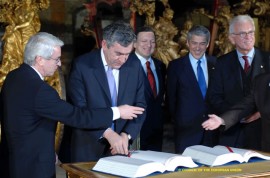
Another signing ceremony for another treaty. I cast my mind back to the signing of the Constitutional Treaty in Rome in June 2004, when my Italian hosts (I was in Italy at the time) were offended by the bad behaviour of their prime minister, Silvio Berlusconi. He had picked up his copy of the treaty to swat a fly, apparently. The Italians do not appreciate a lack of respect.
Three and a half years later, the British ambivalence over Europe is symbolised by Gordon Brown turning up late and signing the treaty on his own. It has the same legal force as the signatures of the other heads of government, but lacks the grace and dignity. Such a pity. But the caravan moves on.
On the treaty itself, I heard some interesting comments by Dr Karen Smith of the LSE at a conference on Monday. She is one of the foremost experts on European foreign policy, and is no starry-eyed Euro-idealist. Her view of the treaty, small step or giant leap, was that “it depends on what we make of it”. If we were to design institutions for European foreign policy from scratch, she said, we would not design the institutions the Reform treaty will give us.
But that’s one of the interesting things about the European Union, of course. We are not – and never will – designing institutions from scratch. Europe is made up of countries, and the political union of Europe will be based on those countries, and that means all kinds of confusions over history and interests and habits and everything else. Every time someone complains about the complexity of the treaties, point this out. We could have a simple system, but it would require compromises and concessions that the member states were not ready to make. That’s not a criticism, that’s simply a fact.
In terms of the impact of the Reform treaty on the foreign policies of the Union, Dr Smith expressed a fear that the long-term structural elements of the EU’s foreign policy – trade and aid and cooperation agreements put in writing – might be weakened in the face of short-term but high profile crisis management. I think that’s a very important point. The very foundations of the EU itself are based on long-term structural commitments by the different member states to each other; the success of their collective foreign policy is based on bringing that same approach to their relations with the rest of the world.
Speaking at the same conference, Professor Jo Shaw from Edinburgh University observed that the opt-outs claimed by the UK for justice and home affairs might turn out to be counter-productive. Her impression was that the UK wanted to maximise its freedom of manoeuvre in these policy areas, and that the opt-outs were intended to achieve this. In fact, because of the importance of making long-term structured commitments to each other (see above), the UK might in fact turn out to have less freedom to make its own policies and not more.
If that seems ironic, it is in fact the basis of the European project as a whole. Individual countries gain more influence over events by acting together than by acting alone. Shared sovereignty turns out to mean more sovereignty than sovereignty that is guarded and kept apart. Whether we are comfortable with this idea is, of course, up to us. The treaty will turn out to be what we make of it.
